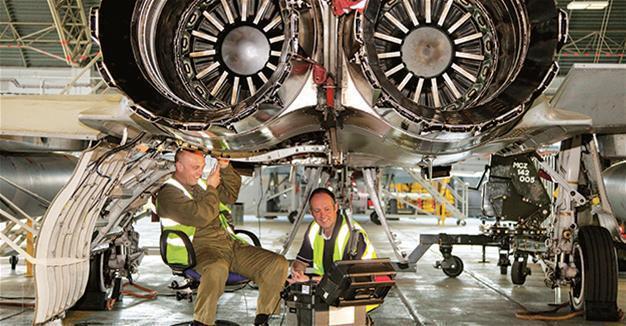Rolls-Royce focusing on defense, nuclear businesses in Turkey
Güneş Kömürcüler - ISTANBUL
 British engineering and manufacturing giant Rolls-Royce, which has operations in key five sectors, will direct its focus toward Turkey’s defense and civil nuclear industries in the near term while prioritizing knowledge transfer, a top company representative has told the Hürriyet Daily News.
British engineering and manufacturing giant Rolls-Royce, which has operations in key five sectors, will direct its focus toward Turkey’s defense and civil nuclear industries in the near term while prioritizing knowledge transfer, a top company representative has told the Hürriyet Daily News. Patrick Regis, Rolls-Royce’s regional director for Turkey and Central Asia, said Turkey’s indigenous fighter jet TF-X project was the number-one project for the company at present but that small modular nuclear reactors (SMRs) would follow in the future.
The company has a unique position in Turkey, which “has a developing demand for every one of the five sectors in which Rolls-Royce is involved,” Regis said.
The company operates in civil aerospace, defense aerospace, marine, nuclear and power systems.
“What is key for Turkey is that every one of these businesses is very engaged and this is very unusual for a country in which we are operating. India and China have a huge scale. Turkey does not have this scale or volume, but it has a very specific demand. That is exactly what we can offer from nuclear to defense or others. That is unique for a company being in a country which has a developing demand for every one of the sectors in which it is involved,” he said in Istanbul on the sidelines of a defense fair that ended on May 13.
Three sectors are of great importance for the company right now, he noted.
“Defense is big for us right now. Then we see high potential in the nuclear business,” said Regis, adding that this would followed by power systems.
Under the MTU brand of Rolls-Royce Power Systems, the company develops and produces high-speed engines and propulsion systems for ships and heavy land, rail and defense vehicles, as well as drive systems for use in the oil and gas industry and power generation.
“The TF-X project is number one for us and the SMRs will follow this,” Regis noted.
Turkey’s Kale Group and Rolls-Royce will establish a joint venture to develop civilian and fighter aircraft engines, including one for Turkey’s TF-X fighter jet, the companies announced on May 8.
Kale will hold a 51 percent stake in the joint venture, while Rolls-Royce will control the rest. In the initial stage, some 350 Turkish engineers are expected to be hired by the joint venture and be sent to the Rolls-Royce headquarters in the United Kingdom to acquire the necessary engineering training.
On the nuclear side, Regis noted a Rolls-Royce-led initiative that has focused on developing a fleet of SMRs for the civil nuclear industry.
“We proposed to Turkey last year to be a part of this initiative and this is being discussed right now. We want Turkey to be a part of it,” he said.
Regarding the civil aerospace sector, Turkish Airlines is of great importance, Regis said, adding that he believed the national carrier would start to take big orders by early next year.
Knowledge transfer is ‘key strategy’
Rolls-Royce’s Turkey strategy is based on transferring knowledge to the country’s industrial base, he said, adding that the company had been fostering this strategy through several key projects, including the establishment of an advanced manufacturing technology center (AMTC) in Turkey.
Rolls-Royce signed a memorandum of understanding in 2015 with the Scientific and Technical Research Council of Turkey (TÜBİTAK) to open the center.
The partnership will focus on increasing indigenous manufacturing capability and technology transfer in the aerospace sector as well as in the civilian nuclear, defense, marine and industrial sectors.
“We believe Turkey can grow by becoming more capable and more competitive globally. This is a platform for Turkey to get more capabilities in a number of key areas,” Regis said.
Rolls-Royce has five such centers in the U.K. and one in the United States and in Singapore for each.
According to Regis, Turkey has very strong universities, especially in technical areas, and many extremely strong industries, including the construction, shipbuilding and defense sectors.
“We came late to Turkey. This model, which is based on knowledge transfer, will be great for Turkey and its universities and industries. It has a strong industrial base, but these are not always globally competitive. This center will help Turkey to achieve this. This is a unique model,” he said.
“This is a win-win game. We can also use what we have developed together. We can be partners of developing, manufacturing and selling things together,” he added.
















